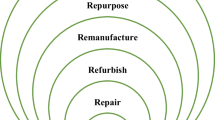Abstract
South Africa is pioneering a new sustainable development model which has the ability to overcome current environmental and resource management problems, whilst achieving improvements in resource productivity and eco-efficiency. This model, formally accepted in 2012 and termed the ‘circular economy’, is understood to mean the realisation of a closed loop of material flows in the South African economic system as it relates to solid waste management. Successful implementation of this model is seen as one way in which South Africa can develop from its past environmental damage that is typically seen when developing economies industrialise. The paper will introduce the development of the model in South Africa, which includes the proposed strategy to implement the circular economy to ensure sustainability. To achieve the objective of this paper, reference will be made to a selected metropolitan council located in the Western Cape Province in South Africa, which will serve as the case study for analysis from a South African perspective. To contextualise the foregoing, the legislative and regulatory framework will be presented as well as a brief review of the curricular economy with regard to developing countries and will conclude with the identification of barriers and challenges to the implementation of the circular economy in South Africa. Interviews conducted with senior municipal officials at the selected metropolitan council reveal that the impact of the divisive interventions and waste minimisation projects is very low, which is a general in finding for all municipalities in South Africa. As reflected in the statistics, the use of recycled raw materials is relatively low. A further challenge is the implementation costs of the proposed EPR which will be extremely high with the burden borne mainly by industry, and in addition, the establishment of the administrative infrastructure to support EPR will also be costly. Finally, the competence and sophistication of industry to introduce changes to the production processes have also been raised as a concern.
Access this chapter
Tax calculation will be finalised at checkout
Purchases are for personal use only
Similar content being viewed by others
References
De Jong, S., van der Gaast, M., Kraak, J., Bergema, R., & Usanov, A. (2016). The circular economy and developing countries: A data analysis of the impact of a circular economy on resource-dependent developing nations. COE—Resources Issue Brief No. 3. The Hague Centre for Strategic Studies, Netherlands.
Department of Environmental Affairs. (2017). Maximising the circular waste economy in South Africa PCEA colloquium on waste management industry waste plans presentation. South Africa: Pretoria. Available from http://pmg-assets.s3-website-eu-west-1.amazonaws.com/170314Industry_Waste.pdf. Accessed October 06, 2017.
Erses Yay, A. (2015). Application of life cycle assessment (LCA) for municipal solid waste: A case study of Sakarya. Journal of Cleaner Production, 94(1), 284–293.
Jinhui Li, Q. S., & Zeng, X. (2015). Minimizing the increasing solid waste through zero waste strategy. Journal of Cleaner Production, 199–210.
Nkosi, N., Muzenda, E., Zvimba, J., & Pilusa, J. (2016). The current waste generation and management trends in South Africa: A Review. South Africa: Pretoria, Government Printer.
Pearce, D. W., & Turner, R. K. (1990). Economics of natural resources and environment. Harvester Wheatsheaf, John Hopkins University Press.
Winkler, H. (2011). Closed-loop production systems—A sustainable supply chain approach. CIRP Journal of Manufacturing Science and Technology, 4(1), 243–246.
Author information
Authors and Affiliations
Corresponding author
Editor information
Editors and Affiliations
Rights and permissions
Copyright information
© 2020 Springer Nature Singapore Pte Ltd.
About this paper
Cite this paper
Tahulela, A.C., Ballard, H.H. (2020). Developing the Circular Economy in South Africa: Challenges and Opportunities. In: Ghosh, S. (eds) Sustainable Waste Management: Policies and Case Studies. Springer, Singapore. https://doi.org/10.1007/978-981-13-7071-7_11
Download citation
DOI: https://doi.org/10.1007/978-981-13-7071-7_11
Published:
Publisher Name: Springer, Singapore
Print ISBN: 978-981-13-7070-0
Online ISBN: 978-981-13-7071-7
eBook Packages: Earth and Environmental ScienceEarth and Environmental Science (R0)




